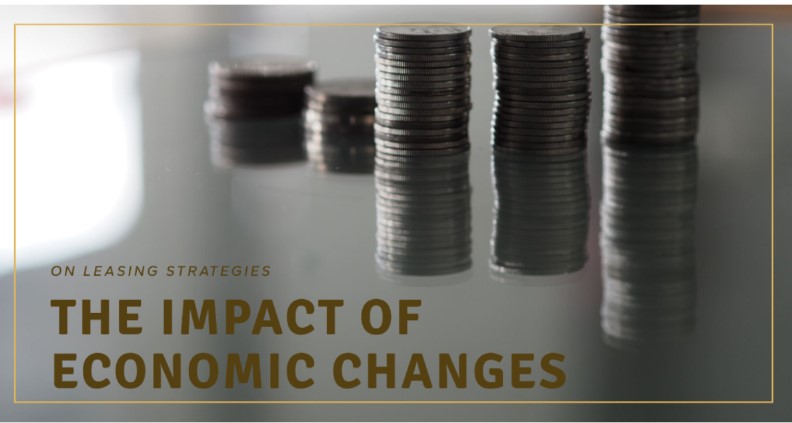The dynamic nature of the global economy influences various business strategies, including leasing. As economies fluctuate due to inflation, interest rates, and market demand, businesses must adapt their leasing strategies to remain competitive and sustainable. The COVID-19 pandemic exemplified the profound impact economic changes can have, disrupting industries worldwide and prompting a reevaluation of leasing approaches. This article explores how economic shifts affect leasing strategies, examining key aspects such as lease terms, cost structures, risk management, and investment decisions.
Economic changes can lead to fluctuations in the demand for leased assets, affecting occupancy rates and rental income. For instance, during economic downturns, businesses may downsize or delay expansion plans, resulting in lower demand for commercial spaces. Conversely, in periods of economic growth, the demand for leasing may increase as businesses seek to capitalize on new opportunities. To navigate these shifts, companies must adopt flexible leasing strategies that allow for adjustments in response to changing market conditions.
Adjusting Lease Terms:
Economic changes often require adjustments in lease terms to align with current market realities. During economic uncertainty, businesses may seek shorter lease terms to maintain flexibility and mitigate long-term commitments. Short-term leases provide the advantage of adapting quickly to changing circumstances, such as relocating to more affordable locations or downsizing operations if necessary. On the other hand, during stable economic periods, businesses might prefer longer lease terms to secure favourable rates and establish stability.

Lease agreements may include clauses that account for economic fluctuations, such as rent escalation clauses tied to inflation or economic performance indicators. These clauses ensure lease payments remain fair and reflect the prevailing economic environment. By incorporating adaptive lease terms, businesses can better manage their financial commitments and reduce the risks associated with economic volatility.
- Natalia Dávila Merlo, Content Marketing Manager at Ling
Cost Management in Leasing:
Effective cost management is crucial for businesses to thrive amid economic changes. Leasing strategies must account for variable costs, such as maintenance, utilities, and taxes, which fluctuate based on financial conditions. During inflationary periods, these costs may rise, necessitating adjustments in budgeting and expenditure. Businesses can negotiate lease agreements that include cost-sharing mechanisms, where landlords and tenants share the burden of increased expenses, thereby mitigating the impact on either party.
Businesses can leverage technology and data analytics to optimize cost management in leasing. Companies can identify cost-saving opportunities and implement efficiency measures by monitoring real-time data on energy consumption, maintenance needs, and occupancy rates. For example, predictive maintenance technologies can reduce downtime and repair costs, while energy management systems can lower utility expenses. Implementing such strategies enhances cost control and ensures sustainable leasing practices in varying economic conditions.
- John Wither, Managing Director of Geowarmth
Risk Management and Mitigation:
Economic changes inherently bring risks that can impact leasing strategies. Businesses must adopt comprehensive risk management approaches to mitigate potential disruptions. One approach is diversification, where companies spread their leasing portfolio across different geographic regions or asset types. Diversification reduces the reliance on a single market and minimizes the impact of localized economic downturns. For example, a business leasing office spaces in multiple cities can offset losses in one market with gains in another.
Another critical aspect of risk management is conducting thorough due diligence before entering lease agreements. Businesses should assess landlords’ financial stability and reputation and the condition and location of leased assets. This evaluation helps identify potential risks, such as property depreciation or unfavourable market conditions, enabling businesses to make informed leasing decisions. Additionally, insurance coverage can provide a safety net against unforeseen events, such as natural disasters or economic crises, further safeguarding leasing investments.
- Andy Fryer, Co-Founder of Easy Signs
Investment Decisions in Leasing:
Economic changes significantly influence investment decisions related to leasing. During periods of economic growth, businesses may prioritize leasing over purchasing assets to conserve capital and maintain liquidity. Leasing allows companies to allocate resources to core operations and strategic initiatives rather than tying up funds in property ownership. Moreover, leasing provides flexibility to upgrade or relocate to newer, more efficient spaces as business needs evolve.
Conversely, businesses might consider purchasing assets instead of leasing businesses might consider buying assets instead of leasing in times of economic stability or low interest rates. Ownership offers long-term cost savings, potential appreciation in property value, and greater control over the use of the asset. Businesses must carefully weigh the benefits of leasing versus ownership based on their financial goals, market conditions, and long-term strategies. By aligning investment decisions with economic trends, businesses can optimize their leasing strategies and achieve sustainable growth.
- Daniel Foley, Co-founder at Assertive Media
Technology and Innovation in Leasing:
Integrating technology and innovation has transformed leasing strategies, enabling businesses to adapt more effectively to economic changes. Digital platforms and tools streamline leasing, from property search and evaluation to contract management and payments. Virtual tours, for instance, allow prospective tenants to explore properties remotely, reducing the need for physical visits and expediting decision-making. Additionally, blockchain technology enhances transparency and security in lease transactions, minimizing the risk of fraud and disputes.
Innovation in lease management software also facilitates better decision-making and operational efficiency. Advanced analytics provide insights into market trends, tenant behaviour, and property performance, enabling businesses to make data-driven leasing decisions. For example, predictive analytics can forecast market demand, helping companies to adjust lease terms and rental rates accordingly. By embracing technology and innovation, businesses can enhance their leasing strategies, improve operational resilience, and capitalize on emerging opportunities.
- Tiffany Payne, Head of Content at PharmacyOnline.co.uk
Sustainable Leasing Practices:
Sustainability has become critical in leasing strategies, driven by regulatory requirements and growing environmental awareness. Economic changes can accelerate the adoption of sustainable leasing practices as businesses seek to reduce costs and meet sustainability goals. Green leases, which include provisions for energy efficiency, waste reduction, and resource conservation, align the interests of landlords and tenants in promoting sustainability.
Sustainable leasing practices benefit the environment and enhance business resilience. Energy-efficient buildings, for instance, lower utility costs and improve tenant satisfaction. Additionally, businesses prioritizing sustainability may attract environmentally conscious tenants and investors, creating a competitive advantage. As economic conditions evolve, integrating sustainability into leasing strategies can drive long-term value and support corporate social responsibility initiatives.

- Daniel Foley, head of content at Believe Money
Adapting to Regulatory Changes:
Economic changes often prompt shifts in regulatory frameworks that impact leasing strategies. Governments may introduce new policies or amend existing regulations to address financial challenges like housing shortages or market imbalances. Businesses must stay informed about these regulatory changes and adapt their leasing practices accordingly. For instance, tax or zoning regulation changes can affect the cost and feasibility of leasing specific properties.
Compliance with regulatory requirements is essential to avoid legal and financial penalties. Businesses should work closely with legal and real estate experts to navigate regulatory complexities and ensure lease agreements align with current laws. Additionally, proactive engagement with policymakers and industry associations can provide valuable insights into upcoming regulatory changes, enabling businesses to anticipate and prepare for their impact. By staying compliant and adaptable, companies can mitigate risks and capitalize on regulatory opportunities in their leasing strategies.
- Jessica Shee from iboysoft.com
Conclusion:
The impact of economic changes on leasing strategies is profound, requiring businesses to adopt flexible, informed, and resilient approaches. Businesses can navigate economic fluctuations and maintain operational continuity by adjusting lease terms, managing costs, mitigating risks, making strategic investment decisions, leveraging technology, embracing sustainability, and adapting to regulatory changes. As the global economy evolves, businesses that proactively refine their leasing strategies will be better positioned to thrive and achieve long-term success. Effective leasing strategies provide stability in uncertain times and drive competitive advantage and sustainable growth in a dynamic economic landscape.
Also, Read The Following: knicks vs pacers match player stats.








